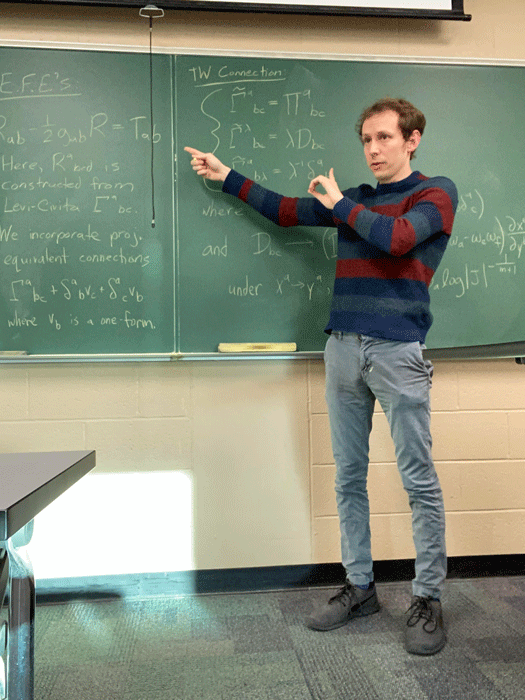Three of the fundamental forces in physics are best described under the framework of quantum mechanics, but physicists have yet to accept a quantum field theory for the fourth force – gravity. The current description of gravity, Einstein’s general theory of relativity, uses an older framework of physics and does not offer concrete connections to quantum physics. One young mathematician wants to bridge this theoretical divide.
The Graduate College has awarded Samuel Brensinger the 2020 D.C. Spriestersbach Dissertation Prize in Mathematics, Physical Sciences, and Engineering. Brensinger, a doctoral graduate of the Applied Mathematical and Computational Sciences program, completed his PhD in 2020 after defending his thesis, Projective Gauge Gravity.

His dissertation introduces projective gauge gravity as an expansion of Einstein’s general theory of relativity. While general relativity is based on differential geometry, the new theory uses projective geometry to incorporate quantum physics into the explanation of gravity. Brensinger’s theory can better describe gravitational forces in many settings but does not necessarily conflicts with the tenets of Einstein’s theory.
“Under certain assumptions and conditions, this theory actually agrees with general relativity, but it can also deviate from it depending on the situation,” says Brensinger. “In certain situations where we believe general relativity is very accurate, my thesis demonstrates that this theory will still be accurate. It also shows where projective gauge gravity could produce some new content that wouldn’t have been there in the original theory.”
Brensinger found an area of mathematical symmetry within the general theory of relativity, in which the equations of motion can be modified without meaningfully changing the underlying physics. The symmetry of the new equations allows for a better description of the mathematics behind gravity. It has also led Brensinger to introduce a new field, the projective gauge field, into his theory of gravity.
Brensinger’s dissertation describes the mathematical basis for projective gauge gravity and establishes it as a self-consistent, dynamical theory. This is supported with the introduction of the dynamic projective gauge field. He proposes that projective symmetry gives rise to dynamics involving gravitational fields and other forces. These projective aspects of his theory distinguish it from general relativity but relate well to other quantum theories of gravity, such as string theory.
“I also tie projective gauge gravity to string theory,” says Brensinger. “My dissertation shows that there is a relationship between those two theories, as well. Being that string theory itself is a widely studied potential theory to answer some similar questions, I think that’s also a useful connection made in my thesis.”
Brensinger’s dissertation demonstrates a connection between projective gauge gravity, string theory, and general relativity, making it consistent with other explanations of gravity. Although this consistency is important for the validity of the theory, projective gauge gravity has the potential to answer questions where other theories are falling short. It could provide a better understanding of dark energy, dark matter, and other aspects of quantum gravity.
The physicists working alongside Brensinger are most interested in projective gauge gravity for this potential application in the areas of cosmology and dark matter. As a mathematician, Brensinger has been motivated more so by the guiding principles and underlying math.
“As a mathematician, the main thing I’m interested in is the guiding principle behind the theory,” says Brensinger. “Although it’s simple, the theory ends up being elegant and robust once you work out all the mathematics. It’s nice to see that it really is a solid theory in its own right.”
Brensinger is grateful for the unique opportunities afforded to him while completing his program at Iowa. These led him to be recognized with the Catharine Wegner Outstanding Mathematics Teaching Assistant Award in 2017. He was also awarded the Ballard & Seashore Dissertation Fellowship in 2019. The D.C. Spriestersbach Dissertation Prize is the most recent recognition from his alma mater.
“It was a surprise when I found out about the award, especially because it was a month before I was going to be defending my thesis,” says Brensinger. “I kept finding so many little things that made me worry it wouldn’t be good enough, so getting the news that I won the Spriestersbach Prize was a big confidence booster and really reassuring.”
Since defending his dissertation, Brensinger has joined the University of Dayton’s Department of Mathematics. While much of his time is spent teaching, he continues to conduct research and publish papers on projective gauge gravity with Iowa colleagues. Winning the Spriestersbach award also allows him to present his research on a national scale as Iowa’s nominee for the 2020 CGS/ProQuest Distinguished Dissertation Award in Mathematics, Physical Sciences, and Engineering.
“I was honored just to be nominated for the Spriestersbach Prize,” says Brensinger. “The support I got from the people I worked with and those who wrote letters for me couldn’t have been better. I loved the time I spent at the University of Iowa, so to have my thesis representing Iowa at this national award competition is a dream come true.”